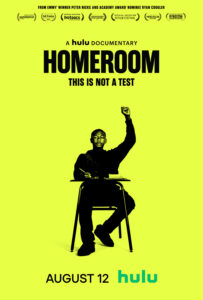Film Review: In “Homeroom,” Bright Young Oakland Students Prepare for the Future
Written by: Christopher Llewellyn Reed | August 11th, 2021

Homeroom (Peter Nicks, 2021) 3 out of 4 stars.
At the start of the 2019-2020 academic year, Oakland High School seniors, like their counterparts everywhere, expected the usual joys and challenges, highs and lows, of graduation and what would come after. No one predicted the COVID-19 pandemic and surge of nationwide protests against police brutality in the wake of George Floyd’s murder. Which makes Homeroom, the new documentary from director Peter Nicks (The Force), take a turn for the unexpected (for the subjects) in its final third. The fact that we, the audience, know what’s coming only serves to heighten the poignancy of the first two-thirds. Beyond (and including) that twist, the film is an intimate portrait of a vibrant group of young people of color preparing for a future where they’ll have to make their own luck. The classroom may provide some education, but the real lessons are out in the world.
In the fall, the main concerns are applying for college and resisting the Oakland Unified School District’s calls for budget cuts. Two kids in particular, Denilson Garibo and Mica Smith-Dahl, serve as student directors on that board, voicing the concerns of their constituents over the continued presence of police officers in their school: the district is the only one in California’s Alameda County with a force of its own. In an emotional plea, they point out that none of them feel safe with the history of police violence towards people who look like them. The $2.5 million spent on those officers could better be used elsewhere, given the budget crisis. Notwithstanding their clearly articulated arguments, the board does not agree, though some vote in favor.

But these actions prove motivating for many discussions about sticking together and supporting communities of color. There is no doubt that Denilson, Mica and their classmates will continue to spread their wings and become ever-more dynamic actors for change. And despite what most of them consider their distressingly low SAT scores, they gamely write college essays and submit applications. Though Nicks doesn’t dwell on it, the reality of those scores merely underlines the uselessness of that ostensible aptitude test, given the obviousness intelligence and drive of our protagonists. It truly is time to jettison that culturally biased, desperately imperfect form of assessment.
And then COVID-19 happens, and all plans are put on hold. From abandoned schools to virtual Zoom meetings, we watch as everyone adjusts to social distancing and masking. When local activists organize marches against police violence, the students join in, though Denilson, whose family is undocumented, worries what might happen to them if he is arrested. While those fears prove unfounded, what does occur as a result of the protests is a delightful surprise (not to be spoiled here). By the end, though the Oakland High School seniors miss an in-person graduation ceremony, they receive something far more precious, which is validation.

Nicks films this all with cinéma vérité-style intimacy, never interrupting the proceedings with interviews or voiceover commentary. Unfortunately, he has a tendency towards sentimental montages, which detract from the otherwise fine mise-en-scène. He also rushes through the pandemic days, skipping beats that might lead to greater final resonance. Still, it’s ultimately a documentary of many strong qualities. With a homeroom like this, first period is sure to amaze.

